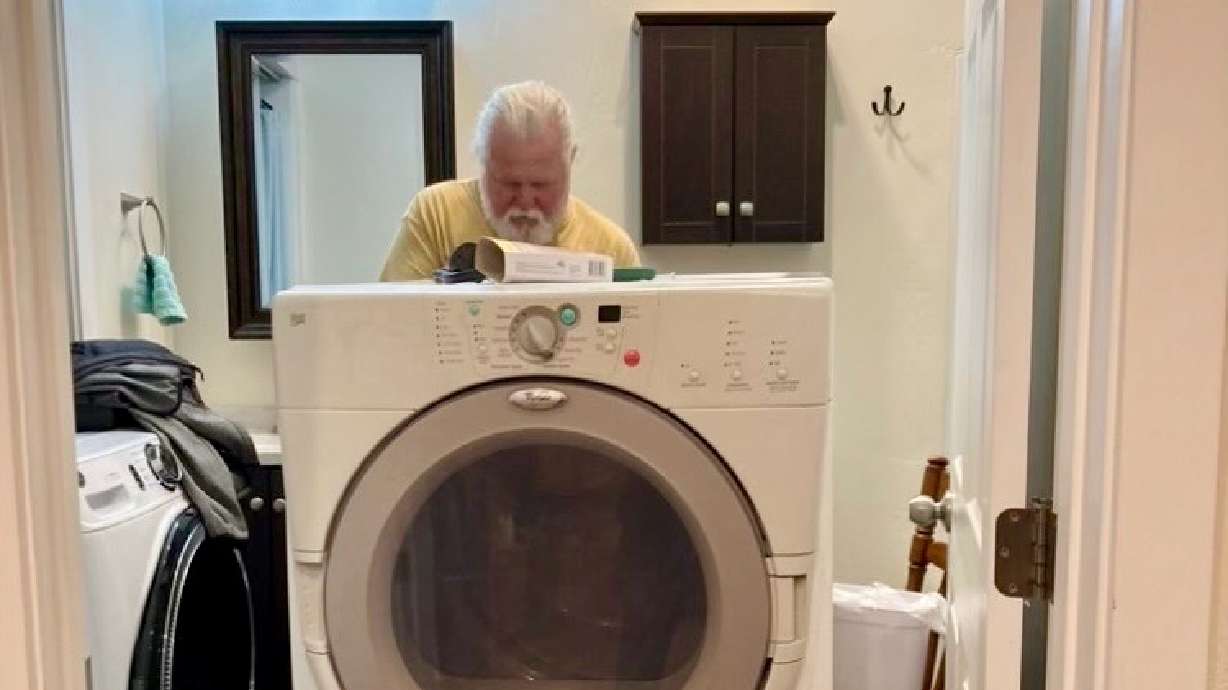Estimated read time: 4-5 minutes
This archived news story is available only for your personal, non-commercial use. Information in the story may be outdated or superseded by additional information. Reading or replaying the story in its archived form does not constitute a republication of the story.
PETERSON, Morgan County — As Beth Braithwaite describes it, the efforts she and other members of her community put forward in helping a refugee family resettle in northern Utah have been cathartic.
"I am just seeing the kindness and the goodness of humans and mankind," she said. "That's healing to me and healing to the family."
International refugees coming to Utah typically get assistance from one of three agencies with the expertise to help them with the transition — Catholic Community Services, the International Rescue Committee or Cache Refugee and Immigration Connection.
But a new federal program — Welcome Corps — lets "everyday Americans" lead the process, and Braithwaite and several others from Peterson in Morgan County tapped into it in assisting the refugee family from South America. Their organization, MorganCountyCares, is the first in Utah to use the program to help a refugee family, with around 10 other groups around the state and more across the nation ready to help refugees as well.
"This program is a really neat fit for Utah because we are really service-oriented. People really want to do something to help, and this is a really very tangible way that they can help," said Lam Nguyen, refugee sponsorship coordinator with the Utah Department of Workforce Services' Refugee Services Office. The Refugee Services Office is working with Welcome Corps, an initiative of the U.S. State Department, in promoting the nationwide program, with more refugee families likely to reach Utah starting in late September.

The new program isn't designed to displace Utah's three refugee agencies as conduits for refugees coming to Utah. Rather, Nguyen said, it's meant to complement their efforts, potentially bolstering the numbers of refugees coming to the state. "Our resettlement agencies are still resettling refugees. This would just add to our state's capacity to help more refugees, because our settlement agencies have been stretched, they have limited resources and staff," she said.
According to Refugee Services Office figures, there are some 32.5 million refugees around the world. in Utah, with 65,000 refugees, the largest contingents come from Somalia, Sudan, South Sudan, Iraq and the Democratic Republic of the Congo. Since 2019, there has been a spike in refugees coming to Utah from Afghanistan and Ukraine.
From 2019 to 2023, a total of 4,649 refugees — who face vetting by U.S. authorities — resettled in Utah, more than 60% of them from Afghanistan, Congo and Ukraine.
Refugees, as defined by U.S. guidelines, are people forced from their home countries due to persecution. The persecution can stem from their race, nationality, religion, political opinions or membership in a "particular social group," according to the Department of Workforce Services. Whatever the particulars, they are vetted by the U.S. Department of Homeland Security and only a limited number get permission to come to the United States.
Braithwaite didn't get into the details of the family the Peterson area group helped as a safety precaution, given the persecution they faced in their home country. The family reached Utah in January and has been adjusting to life in the United States.
"They have their ups and downs and they are resilient," she said.
Nguyen, though, noted the tough experiences refugees have typically had to endure before they are resettled, presuming they even reach the milestone. "As a refugee, you've been completely displaced and disconnected for a really long time, sometimes 20-plus years from any sort of normalcy," she said.
Accordingly, Nguyen said, those taking part in the Welcome Corps program can have a big impact in helping refugees move beyond the hardships they've faced. "Having a community here that's caring, that is invested and that is kind — and will connect them to their network, to their support — can make a huge difference," Nguyen said.
It's not easy, though.
Before the refugees arrived, Braithwaite said the Morgan County group, made of five key members, created committees focused on laying the groundwork to address their housing, employment, medical and cultural needs on reaching Utah, per Welcome Corps guidelines. Sponsors are also required to raise $2,375 per individual they help, and Braithwaite said the Morgan County group raised more than $10,000, underscoring the broad support in the community.
"It's a big responsibility," Braithwaite said. Welcome Corps, Department of Workforce Services and Cache Refugee and Immigrant Connection representatives also offered assistance.
Danny Beus, executive director of Cache Refugee and Immigrant Connection, which is based in Logan, lauded the efforts of the Morgan County group. "It's not an easy thing, but the Morgan case was really successful. It's amazing what happens when people that genuinely care about doing good do that in their communities," he said.
As for the South American family, the Morgan County supporters still keep contact, but also make sure to give them space as they make the adjustment. "It's not without its difficulties. But they're friendly people, good workers and people really like them," Braithwaite said.
The efforts, she went on, seem to be paying off, most notably for the family but also for the community members who have offered to help. "It has been difficult but it has been so rewarding," she said.









